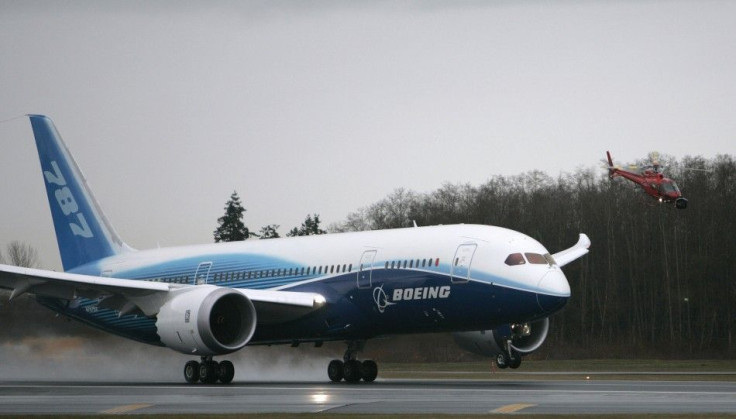Boeing 1Q Profits Up On Stronger Airline Sales

(Reuters) - Boeing Co turned in a stronger-than-expected quarterly profit on Wednesday as the company was able to ramp up production to meet rising demand.
Shares of Boeing, which makes commercial airplanes and military products, gained more than 3.8 percent to $76.02 after the company raised its earnings forecast for the year.
Boeing raked in orders while accelerating production on all its commercial airplane programs. The achievements helped erase concerns in the industry about Boeing's credibility, which was tarnished in the last decade by problems bringing the long-overdue 787 Dreamliner to market.
Investor confidence is with the company, said Alex Hamilton, managing director of EarlyBirdCapital. So right now, the street is pretty much starting to buy into the story that they're going to be able to do it. Personally, I would argue that is a huge sea change for Boeing.
Hamilton noted, in particular, a recent production rate increase for the 787 Dreamliner to 3.5 per month from 2.5 per month as evidence that the company can hit a target of 10 787s per month by the end of next year.
Some aerospace experts, including Hamilton, have said that target is ambitious, given the past glitches in the sprawling global supply chain that feeds that program.
Boeing's first-quarter net profit rose to $923 million, or $1.22 per share, from $586 million, or 78 cents per share, a year earlier.
Boeing's earnings in the quarter and going forward were helped when a California appeals court threw out Pendrell Corp's potentially $775 million victory against Boeing in a lawsuit over launch and satellite contracts between the companies.
Boeing had been setting money aside in case of an unfavorable ruling. The outcome made this provision unnecessary. Excluding a gain related to that, earnings were $1.11 per share, beating the analysts' average estimate of 94 cents, according to Thomson Reuters I/B/E/S.
The company, which competes with EADS unit Airbus for orders, said revenue rose 30 percent to $19.4 billion, topping expectations for $18.4 billion. Boeing said its order backlog at the end of the quarter was $380 billion, up from $356 billion at the beginning of the year.
Boeing raised the upper end of its 2012 profit forecast to $4.35 a share from $4.25 while keeping the low end at $4.15. Its revenue outlook of $78 billion to $80 billion was unchanged.
Revenue at the commercial unit increased 54 percent to $10.9 billion on higher delivery volume and an improved mix of the planes it delivered. The company's shares typically track commercial orders and deliveries.
At the defense business, revenue increased 8 percent to $8.2 billion. Sales of military aircraft rose 27 percent to $4.3 billion. Boeing faces pressure from constrained government defense budgets.
Chief Executive Officer Jim McNerney said in a statement that the company's outlook remained positive and Boeing was focused on its production ramp-up.
We are working closely with our supplier partners to ensure successful production rate increases, he said on a conference call with reporters and analysts.
STRONG ORDER OUTLOOK
Boeing, which gets paid for its airplanes when customers receive them, has said it delivered 137 commercial airplanes in the first quarter, up 32 percent from a year earlier.
Boeing logged orders for 805 commercial airplanes in 2011, adjusted for cancellations. As a result, it lost the race to Airbus, which had orders for 1,419. Boeing has pledged to strike back in 2012 with sales of its revamped narrowbody, the 737 MAX, which features a new, fuel-efficient engine.
The company booked 412 net orders for commercial planes in the quarter, including 301 firm orders for the MAX. The MAX competes with the Airbus A320neo, which also has new engines.
Going forward we believe it is going to be 'up and away' as orders continue to pick up for its new commercial product lines and as production continues to be ramped up for both narrow-body and wide-body type aircrafts, said Ray Neidl, an aerospace analyst with Maxim Group.
Boeing aims to raise production on the 737 to 42 per month in 2014 from the current rate of 35 per month.
Since April 14, Boeing has been assessing the impact on its operations resulting from a tornado that disrupted production and deliveries from a key supplier, Spirit AeroSystems, the Wichita company that makes the fuselage for Boeing's 737 and parts of other planes. Spirit restarted production this week.
McNerney said the disruption has not had significant impact on Boeing's operations and that any impact would be manageable.
Boeing's efforts to raise production on its 787 to 10 per month has been questioned in the industry. The first delivery of the new carbon-composite aircraft came last year after three years of delays.
The rate target appeared to be even less realistic in February after Boeing found a flaw on as many as 55 Dreamliners that needed to be corrected before it could deliver the airplanes.
Boeing said previously that the glitch had resulted in signs of delamination on a support structure in the rear fuselage. Delamination occurs when repeated stress causes laminated composite materials to begin to separate.
McNerney said the company has fixed the problem on 14 or 15 planes and that it will not affect Boeing's delivery schedule for the year.
© Copyright Thomson Reuters 2024. All rights reserved.





















